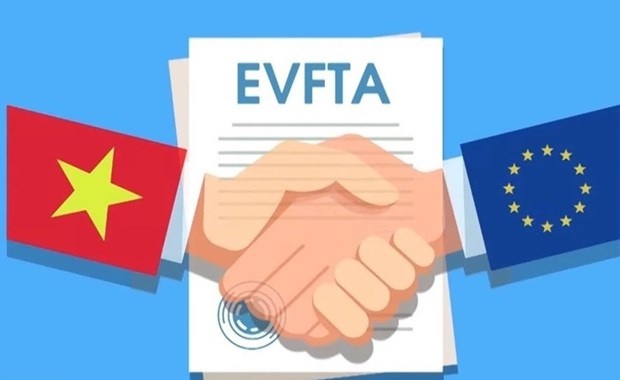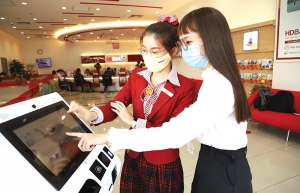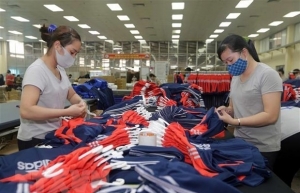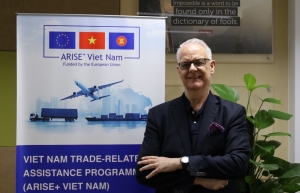Room for agro-exports to grow through EVFTA deal
In mid-July, a European business delegation of 50 high-ranking representatives visited Vietnam and held meetings to seek cooperation opportunities with domestic enterprises in fields of mutual strength. They went on a field trip to learn about the work of Vietnamese farmers, raw material areas, preliminary processing, traceability, and commercialisation of products in the EU market, especially organic products in the Southeast Asian country. It is one of many activities that Vietnam and the EU have organised to promote bilateral trade activities, particularly for agro-products, since the agreement took effect.
 |
| Room for agro-exports to grow through EVFTA deal, Illustrative image (Source: tapchitaichinh.vn) |
Just before the delegation arrived, EU commissioner Janusz Wojciechowski said, “Vietnam has become a key partner for the EU in Southeast Asia. My visit, accompanied by a business delegation of EU agri-food sector representatives, will contribute to taking advantage of the new trade opportunities and allow to showcase the high quality and sustainability standards of EU agri-food production for the benefit of increasingly demanding Vietnamese consumers.”
Vietnam’s agricultural exports to the European market increased rapidly from over $4.5 billion in 2020 to $5.2 billion in 2021. The figure in the first half of this year, meanwhile, has hit nearly $3 billion. The EU is one of the four major export markets for Vietnam's agricultural, forestry, and fishery products and some of Vietnam’s key agricultural items are exported to the EU, such as coffee, pepper, seafood, cashew nuts, and wood and wooden products.
The market’s room is large, but, in reality, the export turnover of Vietnam’s agro-products makes up a tiny part of all agro-products entering the EU.
Speaking at an online forum on diversifying processed and preserved fruit and vegetable products in association with the requirements of the consumer market, organised by the Ministry of Agriculture and Rural Development in early July, Tran Van Cong, Vietnam’s agricultural counsellor in Europe said, “The EU is an important and high-potential market for Vietnam’s agro-products. Especially in the context that prices of goods in this market are climbing due to lack of supply sources, exporters from Vietnam should take this opportunity to increase the market share.”
The room for fruit and vegetables is the biggest. Each year, the EU spends an average of $120 billion importing these products, equaling 40 per cent of the import-export value of these products around the globe. Meanwhile, only $190 million of this figure comes from Vietnam, according to Cong.
Explaining this situation, Nguyen Duc Hiep, deputy director of Intimex My Phuoc SJC – the third-largest Vietnamese coffee exporter – told VIR, “One of the biggest barriers for Vietnam’s agro-products to the EU is the failure to meet the quality standard requirements. The EU issues strict requirements and regulations on technical barriers, pesticide residues, and banned substances. Meanwhile, the domestic agricultural market is highly fragmented and is cultivated by households, thus the application of farming management and control on the usage of pesticides can be fraught with challenges.”
Due to these disadvantages, agro-product companies face difficulties in gathering materials for processing and exporting products, Hiep added. "Pepper and coffee are two examples – the demand for these two products is large, but the materials cannot overcome the appraisal round about the pesticide residues,” Hiep said.
According to Hiep, the EU is currently the company’s key export market with a capacity of 50,000-60,000 tonnes of coffee per year, equalling half of Intimex My Phuoc’s export capacity.
Domestic agro-product exporters also admired that instability and failure in products’ quality is also another barrier for agro-products to set a solid position in the market with approximately 800 million people.
In the first five months of this year, the export turnover of rice to the EU has made up just 0.5 per cent of the total export value of the whole country overseas.
Nevertheless, the EVFTA is set to paint a bright future for Vietnamese rice. As part of the agreement, the EU offers Vietnam a quota of 80,000 tonnes of rice a year, subject to zero tariff rates, comprising 30,000 tonnes of husked rice, 20,000 tonnes of unhusked rice, and 30,000 tonnes of the fragrant variety, according to the Ministry of Industry and Trade.
The EU will also fully liberalise the trade of broken rice, helping Vietnam export an estimated 100,000 tonnes there annually.
Under the EVFTA, 21.3 per cent of Vietnam’s tariff lines for agricultural products are to be abolished. Over 500 of 556 tariff lines of vegetables and fruits, 85.6 per cent of the tariffs on processed fruit and veg, and 93 per cent on coffee and pepper will be duty-free.
The EU will eliminate tariffs on rice products within 3-7 years. As per the research findings of the Ministry of Planning and Investment, the export growth of some of Vietnam’s agricultural products is projected to increase significantly by 2025 as a result of the tariff liberalisation under the EVFTA, such as rice (an additional increase of 65 per cent in 2025), sugar (8 per cent), pork (4 per cent), and beverages and tobacco (5 per cent).
 | Banks to leverage EVFTA adjustments With commitments under the EU-Vietnam Free Trade Agreement, local authorities are contemplating relaxing foreign ownership constraints that have previously hindered bank mergers as mandated by the accord. |
 | EVFTA helps compensate for pandemic-caused economic downturn: experts The implementation of the EU - Vietnam Free Trade Agreement (EVFTA) has greatly helped make up for a downturn in the economy caused by the COVID-19 pandemic, experts said at a workshop in Hanoi on February 25. |
 | EU supporting comprehensive implementation of the EVFTA Implementation of the EU - Vietnam Free Trade Agreement is contributing to promoting trade and investment activities among business communities and people of both sides. Peter Bernhardt, team leader of the ARISE+ Vietnam project, talked with VIR’s Thanh Dat about the impact on Vietnam so far and addressed how the EU can support the country in implementing the deal more effectively. |
 | EVFTA underpinning growth in Vietnamese tech market Changes in consumer behaviour and market trends over the past few years have forced us to rethink the role of technology. Eunjung Han, consultant at Rouse Legal Vietnam and vice chair of the Digital Sector Committee of the European Chamber of Commerce in Vietnam, looks at how the implementation of EU-Vietnam Free Trade Agreement and relevant government policies make impacts on the growth of the local tech market. |
What the stars mean:
★ Poor ★ ★ Promising ★★★ Good ★★★★ Very good ★★★★★ Exceptional
Related Contents
Latest News
More News
- SK Innovation-led consortium wins $2.3 billion LNG project in Nghe An (February 25, 2026 | 07:56)
- THACO opens $70 million manufacturing complex in Danang (February 25, 2026 | 07:54)
- Phu Quoc International Airport expansion approved to meet rising demand (February 24, 2026 | 10:00)
- Bac Giang International Logistics Centre faces land clearance barrier (February 24, 2026 | 08:00)
- Bright prospects abound in European investment (February 19, 2026 | 20:27)
- Internal strengths attest to commitment to progress (February 19, 2026 | 20:13)
- Vietnam, New Zealand seek level-up in ties (February 19, 2026 | 18:06)
- Untapped potential in relations with Indonesia (February 19, 2026 | 17:56)
- German strengths match Vietnamese aspirations (February 19, 2026 | 17:40)
- Kim Long Motor and AOJ Suzhou enter strategic partnership (February 16, 2026 | 13:27)

 Tag:
Tag:




















 Mobile Version
Mobile Version